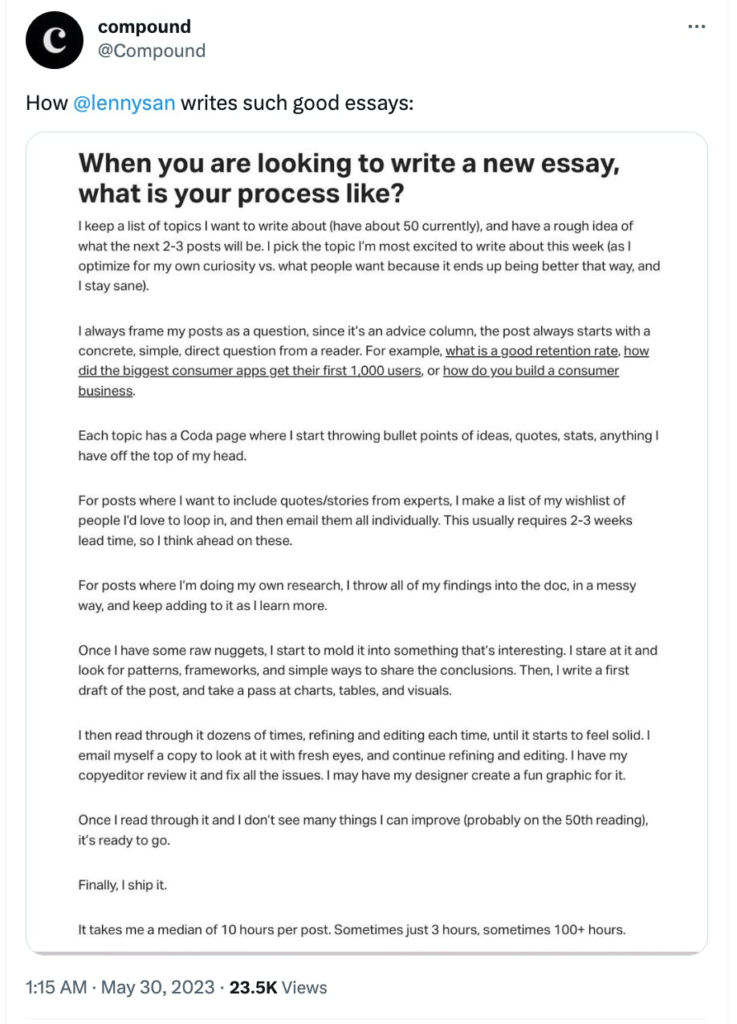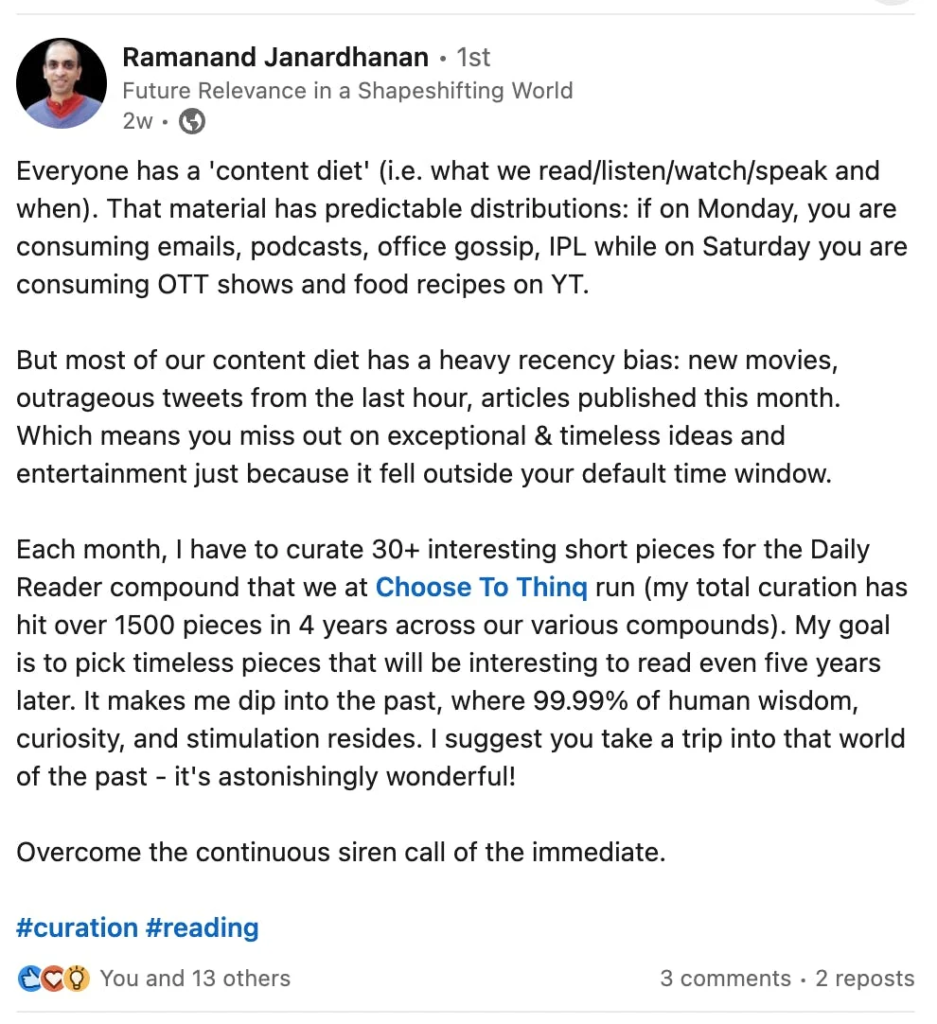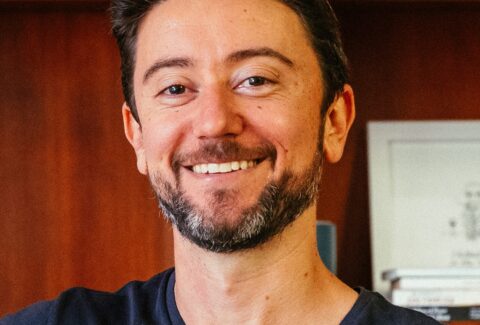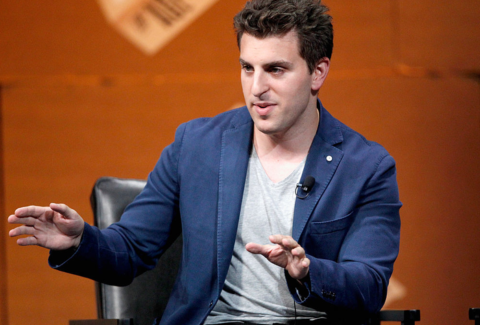My most comprehensive interview on Storytelling
Welcome to the fifteenth edition of ‘3-2-1 by Story Rules‘.
A newsletter recommending good examples of storytelling across:
- 3 tweets
- 2 articles, and
- 1 long-form content piece
Let’s dive in.
🐦 3 Tweets of the week

Good advice for the young – I don’t think I’d be able to do what I do today had it not been for several night-outs during my consulting years!

A lot of useful tips – but what blew my mind was the 50th reading!

An excellent framework for how to argue with someone.
📄 2 Articles of the week
a. Steve Martin on finding your authentic voice – podcast with Adam Grant
In this engaging interview, Adam Grant speaks with the famed comic Steve Martin (seen latest in the hilarious ‘Only Murders in the Building’) and his writing collaborator, Adam Gopnik.
This extract was fascinating to me about how elite performers approach their craft, especially when it involves repetitive work:
Adam Grant: I was just thinking about that in the context of comedy, but also acting where you, you have to repeat the same things over and over again. How do you keep it fresh?
Steve Martin: I was talking to Marty Short, who has done plays on Broadway, and we both agreed that six months in, your performance is completely different than one month in because you’re searching every night. It’s amazing how you can find something new in a line that you’ve said a million times six months later, and comedy is like that too. I’ve been on stage with Marty and I go, “Oh, that’s how that line should be,” or, “Oh, I take out that one word. Why didn’t I see that before?”
Or this one where Steve talks through his career transitions and Adam Grant is reminded of a wise observation:
Steve Martin: There is a throughline for me, and I’ll just tell you what it is: standup comedy. And I’m writing things for that, writing things for standup. But remember I started with The Smothers Brothers Comedy Hour as a writer. So I’m writing sketches, so I have this little, uh, experience with writing sketches and with writing standup, and then movies happened.
Standup led me to movies. And then you start thinking, “Well, I’ve, I’ve written sketches and I’ve written, I could maybe write the screenplays.” ‘Cause otherwise as an actor you’re just waiting, waiting for someone to offer you something or f—so I thought, I’ll, I’ll experiment with that. And I got to write with Carl Reiner and different good writers.
I was trying to get a screenplay written for Roxanne, and I couldn’t find anybody to write it. And just logic said, “Well, you’ve participated in a screenplay and you’ve done this, and so I’ll do that.” And, and then inadvertently I got asked to write something for The New Yorker from Tina Brown. So I started writing prose, and I started thinking, “Well, you can’t just write one. Because that would be a fluke. I have to write another.”
Two still sounds like a fluke. I have to write ten. So you write ten and then you start getting into prose, and then you start thinking, “Hey, what about a longer thing? What do I have anything to say?” And you go, “Well, yeah, I do.”
Adam Grant: This is a great example of a Kierkegaard observation that life can only be understood backward, but it has to be lived forward.
b. Curate your content diet by Ramanand Janardhanan
Ramanand gives some sage advice on not letting the 24-7 news cycle impact our reading. There’s a ton of timeless wisdom out there and Choose to Thinq does a great job of curating good content.

🎤 1 long-form listen of the week
Some self-promotion here – this is my first detailed podcast interview on the topic of storytelling. The episode is a good resource if you want to know my story and my thoughts about the craft of storytelling. Swami’s curiosity and comprehensive questions enabled me to go into a fair amount of detail on the topic. Here are some of the themes/questions that we cover during the conversation:
- My personal journey/thoughts on the topic
- How I got into the realm of Storytelling at work
- What would be my advice to an 18-year old at University
- The best advice I have ever got
- What I believe that others don’t
- My guests to a dream dinner
- My thoughts on how to tell better data stories at work
- The importance of authenticity in storytelling (I discuss the ACE Model)
- How to convey bad news (and how doing it well can actually increase your ethos)
- The 1-3-9 Framework for structuring your data story
- Why I think corporate review meetings are broken and how to make them better
- Design story for product companies – the Hero’s Journey and the 7Cs Framework
- Some other topics
- The importance of reflection in storytelling
- How can we use storytelling techniques in education, including math!
I hope you enjoy the conversation.
That’s all from this week’s edition.
Ravi
Photo by Chase Chappell on Unsplash







